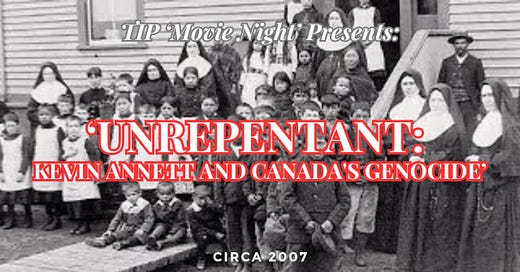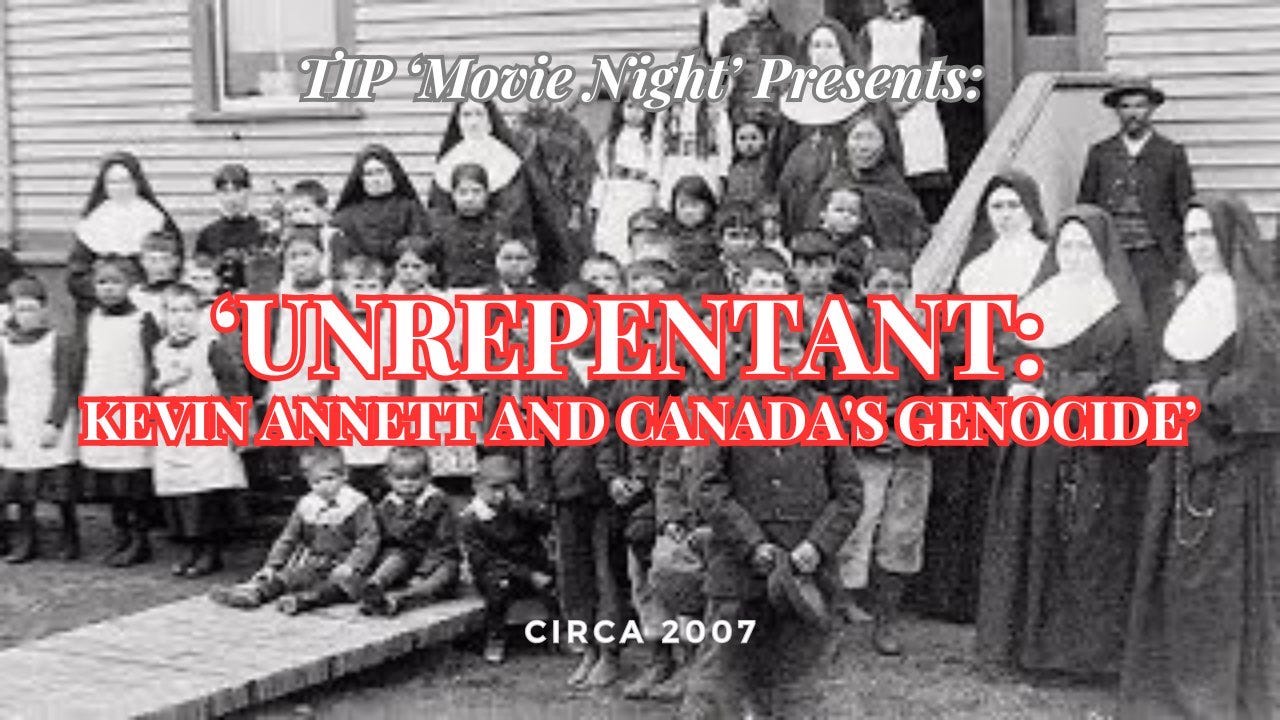TIP 'Movie Night' Presents: 'UNREPENTANT: Kevin Annett and Canada's Genocide' Documentary | 2007
Overview, Takeaways, and Afterthoughts
TIP 'Movie Night' Presents: 'UNREPENTANT: Kevin Annett and Canada's Genocide' Documentary | 2007
Overview:
‘Unrepentant’ delves into the dark, largely hidden history of Canada’s Indian Residential Schools and the systemic genocide inflicted upon Indigenous peoples over centuries. Told through the courageous testimony of Reverend Kevin Annett and survivors of these institutions, the story exposes the brutal realities of colonialism, institutionalized racism, religious hypocrisy, and government complicity in orchestrated mass suffering and cultural eradication.
Reverend Annett reveals his journey from a United Church minister to a whistleblower who sought to uncover and bring to light the atrocities committed in Indian Residential Schools—facilities ostensibly established for the education and spiritual care of Indigenous children but, in reality, sites of mass murder, abuse, cultural destruction, and theft of Indigenous lands. Despite his well-intentioned efforts to open his church doors to Indigenous people and to give a voice to survivors, Annett was met with institutional denial, intimidation, and sabotage by church and governmental officials. Ultimately, he was fired, defrocked, and subjected to character assassination, illustrating how entrenched powers perpetuate silence to protect their interests.
The narrative goes further to describe the depth and breadth of the atrocities—from physical and psychological abuse, medical experiments, and sterilizations under eugenics programs to forced exposure of children to deadly diseases such as smallpox and tuberculosis. These acts were part of a deliberate campaign of genocide aimed at the complete destruction of Indigenous peoples’ cultures, languages, and communities.
Despite insurmountable opposition, Annett persisted in documenting these crimes, organizing tribunals, and publishing crucial testimonies in his book, “Hidden from History: The Canadian Holocaust.” The testimony further broadens to include current effects on Indigenous communities, such as ongoing trauma, social decay, drug abuse, suicide crises, and systemic neglect. Yet, through all this, a message of resistance, truth-telling, and the revolutionary spirit of standing with the marginalized shines through.
Takeaways:
Whistleblowing and Institutional Betrayal:
Kevin Annett’s experience of being fired and defrocked despite his faithful ministry highlights the terrifying reality of how institutions often protect themselves by silencing truth-tellers. This betrayal is a microcosm of broader systemic denial and suppression, where institutional image outweighs justice and morality. It exemplifies the immense courage required to speak truth in the face of overwhelming power and opposition.
The Scale of Genocide Is Systemic and Multi-Dimensional:
Genocide is not just outright killing but rather carried out through cultural annihilation, forced sterilization, medical experimentation, imposed language loss, and theft of land. These methods revealed deliberate policies aiming for the total erasure of Indigenous identity, culture, and existence. This multi-pronged attack reveals genocide as a complex, systemic process extending far beyond physical violence.
Complicity of Church and State in Oppression:
Far from being mere bystanders, religious institutions and governmental authorities were active participants in orchestrating and covering up atrocities. The churches’ cooperation with state policies, including the Indian Act and the sale of Indigenous lands to corporate logging interests, paints a picture of collusion driven by economic, political, and ideological motives. This intertwining of institutional power underscores the difficulty of seeking justice within these structures.
Historical Awareness vs. Public Denial:
The evidence of atrocities, including Dr. Peter Bryce’s 1907 report documenting mass tuberculosis deaths and government records acknowledging death rates, have been publicly available for more than a century. Yet the sustained public denial and media silence reveal a collective social amnesia and intentional suppressive effort, emphasizing how societal healing depends on confronting uncomfortable historical truths.
The Endurance of Indigenous Resistance and Spiritual Resilience:
Despite devastating loss, trauma, and systemic subjugation, Indigenous communities persist. ‘Unrepentant’ highlights the spiritual dimension—God’s presence among the broken and the resilience embedded in storytelling, truth-telling, and communal healing—as essential forces enabling survival and hope. This frames the struggle not just as a political or legal battle, but a spiritual revolution for justice and restoration.
The Continuing Impact of Colonial Violence on Present Day:
Past genocidal policies are linked to modern-day social crises among Indigenous peoples—suicides, addictions, missing women, and systemic neglect. The intergenerational trauma inflicted by residential schools is not a historical artifact but a living legacy. This stark continuity calls for urgent action addressing root causes rather than superficial fixes.
The Need for International Accountability and Justice:
Canada’s ability to suppress truth at the United Nations and manipulate domestic courts reflects how national institutions can evade justice for crimes against Indigenous peoples. The call for international courts and mechanisms to hold state, church, and corporate actors accountable underscores the importance of global solidarity and legal frameworks for redress.
Truth as the Foundation for Healing and Transformation
The narrative powerfully insists that healing cannot come from denial, half-measures, or silence but through the public truth about crimes committed, open accountability, and acknowledgment of genocide. It affirms that while apologies and financial reparations are inadequate alone, facing the truth can dismantle injustice, transform societies, and carve pathways toward genuine reconciliation.
Afterthoughts:
‘Unrepentant’ not only educates, but inspires a call to action: to listen with empathy, to confront the ugly truths buried beneath national narratives, and to stand together as a community in the struggle for justice and healing… reminding us all that the path to true reconciliation begins with the courage to face history honestly and demanding that institutions be held accountable for crimes against humanity ~ thus forging a more just and compassionate future. Kevin Annett’s work is both a wake-up call and an inspiration: a reminder of the power of truth, the cost of oppression, and the necessity of standing boldly for those without voice. Through this work, the light of resistance shines ~ inviting us all to confront shadowy wrongdoings with courage, and to commit ourselves to justice and healing for people around the world
TIP 'Movie Night' Presents: 'UNREPENTANT: Kevin Annett and Canada's Genocide' Documentary | 2007





